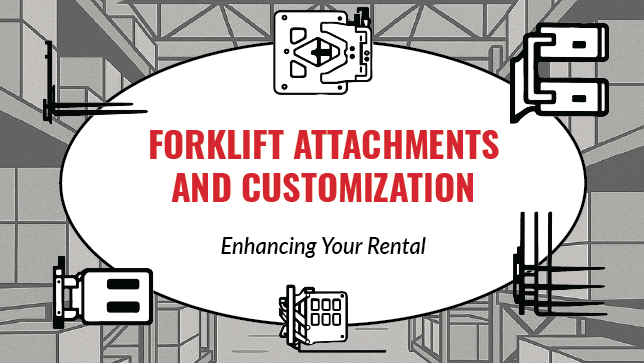The right forklift attachment can make all the difference in today’s fast pace material handling environments. However, not every job justifies a permanent equipment investment. That’s why many operations turn to forklift attachment rentals to meet temporary or seasonal demands.
In this guide, we’ll explore the most commonly rented forklift attachments, their benefits, ideal use cases, and how to choose the right solution for your operation. If you’re looking to get more out of your forklift fleet—without the commitment of ownership—customizing your rental with the right attachment could be the key to unlocking greater productivity and savings.
Let’s dive in!
Understanding Forklift Attachments
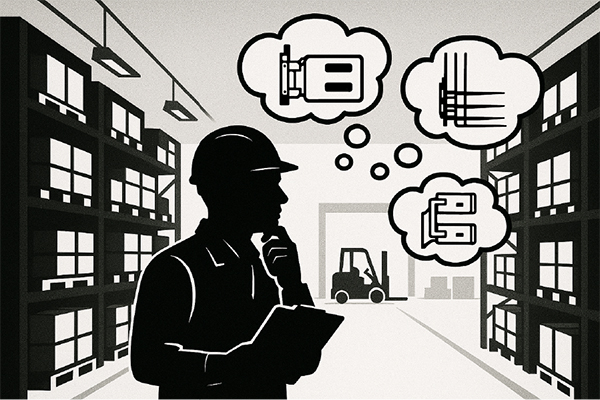
Forklift attachments are add-ons that transform a standard forklift for specialized tasks. They replace or augment the forks to handle unique load types, from paper rolls to shipping containers.
These tools allow forklifts to lift bulky or delicate loads securely, improving safety and preventing product damage. In fact, using a proper attachment is far safer and more efficient than trying to improvise with bare forks for heavy or awkward items.
Attachments greatly increase a forklift’s versatility – but they also require attention to capacity and training. According to OSHA, “attachments can affect a truck’s center of gravity, visibility, and rated capacity,“ so operators must be trained and equipment labels updated accordingly.)
Commonly Rented Forklift Attachments
Many businesses turn to forklift attachment rental to meet temporary needs. Rental terms are typically flexible (daily, weekly, or monthly), allowing you to pick the duration that fits your project. Here we cover each common attachment’s benefits, use cases, industries, and approximate rental cost.
Roll Clamp Attachments
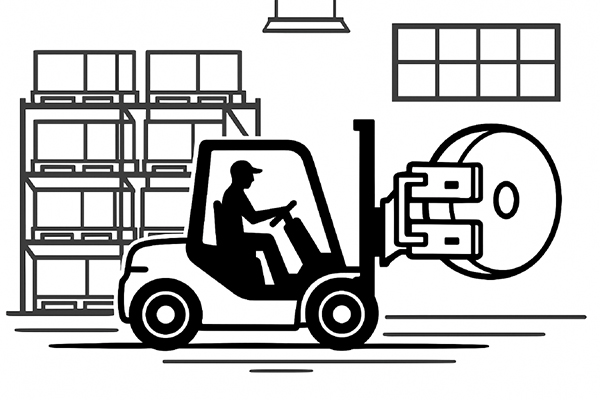
Benefits
A roll clamp allows forklifts to securely grab and carry large cylindrical rolls (such as paper rolls) without using pallets. It applies the right clamping pressure to avoid damaging the product while lifting. This attachment is ideal for handling rolls efficiently, preventing the slippage or crushing that could occur with normal forks.
Use Cases
Rent a roll clamp when you need to move heavy rolls for a short-term project or seasonal surge. For example, a printing company might rent one during a big newsprint run, or a warehouse might need it when handling large rolls of fabric or carpet for a special order. Businesses that don’t regularly handle rolls can save money by renting this specialized tool only when needed, rather than buying it outright.
Industries
Paper mills, publishing and printing companies, packaging manufacturers, and textile producers commonly use roll clamps. Any industry that deals with spools or rolls (paper, fabric, cable reels, etc.) can benefit from this attachment. These sectors often rent roll clamps to handle occasional large shipments or to avoid halting production when an in-house clamp is down for maintenance.
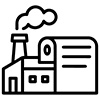
Paper Mills
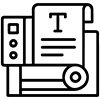
Printing
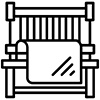
Textiles
Rental Cost: Roll clamps tend to be one of the pricier attachments due to their size.
Expect to pay roughly:
| Rental Duration | What you can expect to pay |
| Day | $130 – 160 |
| Week | $250 – 300 |
| Month | $750 – 900 |
Note: These are not our prices but rather a useful benchmark for what you might pay to rent an attachment. Rental pricing may vary based on additional factors such as equipment condition, brand, and service inclusions.
Bale Clamp Attachments
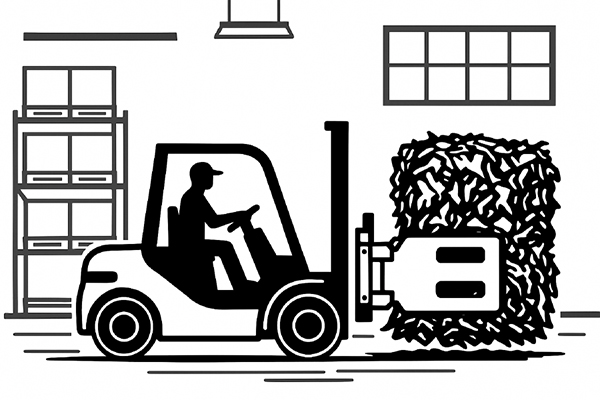
Benefits
Bale clamps equip your forklift to squeeze and carry baled materials without pallets. They have large, smooth clamping surfaces to hold bales (like cotton, recycling materials, or hay) firmly but gently. By renting a bale clamp, you can handle bulky, pallet less loads safely and avoid the damage or spillage that improvised methods might cause.
Use Cases
It makes sense to rent a bale clamp when your operation occasionally needs to move or stack baled goods. For instance, an agriculture supplier might rent one during harvest season to move hay bales, or a recycling center might need extra bale clamps to handle a spike in recycled paper or plastic bales. Renting lets you scale up for peak demand without investing in an attachment that sits idle most of the year.
Industries
Agriculture, recycling, and textile industries are big users of bale clamps. Companies dealing with cotton, wool, tobacco, waste paper, rags, or other baled commodities often utilize these attachments. They may not use bale clamps daily, so renting is popular for industries like farming (for hay and straw bales) and waste management (for compressed recyclables).

Agriculture
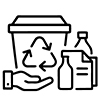
Recycling

Textiles
Rental Cost
Bale clamp rentals are typically in the mid-range. You can expect roughly:
Expect to pay roughly:
| Rental Duration | What you can expect to pay |
| Day | $120 – 150 |
| Week | $220 – 270 |
| Month | $650 – 800 |
Note: These are not our prices but rather a useful benchmark for what you might pay to rent an attachment. Rental pricing may vary based on additional factors such as equipment condition, brand, and service inclusions.
Carton Clamp Attachments
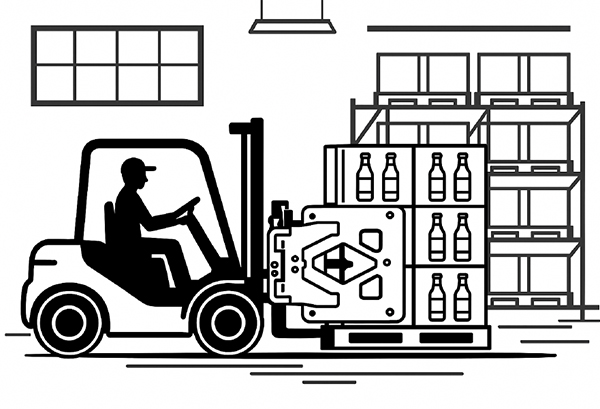
Benefits
Carton clamps allow a forklift to handle large cartons, boxes, or appliances without a pallet. They have broad, flat pads (often with rubberized coating) that clamp onto the sides of a load, distributing pressure evenly. This prevents damage to the product packaging while securely gripping it. Renting a carton clamp lets you efficiently move bulky boxed goods and reduces the need for manual handling or disposable pallets.
Use Cases
Consider renting a carton clamp when you need to load, unload, or store large heavy boxes temporarily. Common scenarios include warehousing operations dealing with big appliance cartons, furniture distribution during peak season, or any short-term project where many pallet-less boxes must be handled. A rented carton clamp can turn a standard forklift into a dedicated appliance or carton handler for as long as you need it, then be returned when the job is done.
Industries
Warehousing, consumer electronics, beverage distribution, and appliance manufacturers frequently use carton clamps. For example, beverage warehouses might clamp and lift stacks of soda cartons, and appliance companies move refrigerator or washing machine boxes without pallets. These industries rent carton clamps to boost capacity during busy periods or to avoid tying up capital in equipment used only occasionally.
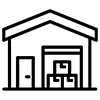
Warehousing
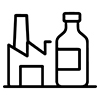
Beverage
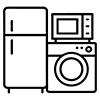
Appliances
Rental Cost
Carton clamp rentals are similar in cost to bale clamps. Expect to pay roughly:
| Rental Duration | What you can expect to pay |
| Day | $120 – 150 |
| Week | $220 – 270 |
| Month | $650 – 800 |
Note: These are not our prices but rather a useful benchmark for what you might pay to rent an attachment. Rental pricing may vary based on additional factors such as equipment condition, brand, and service inclusions.
Push/Pull Attachments (Slip Sheet Equipment)
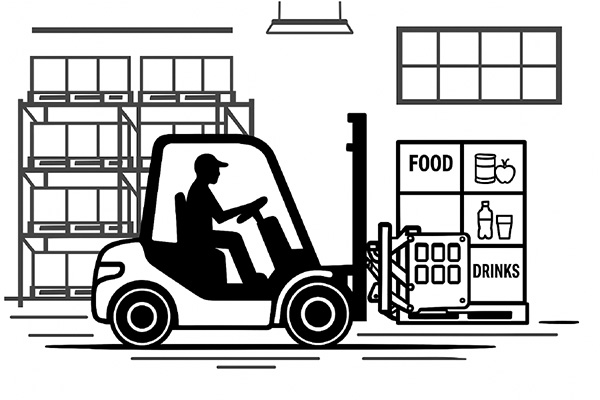
Benefits
A push/pull attachment lets a forklift handle loads on slip sheets instead of pallets. It uses a gripper and push mechanism: the device clamps onto a cardboard or plastic slip sheet under a load and pulls it onto a thin metal platen, or pushes it off. This eliminates the need for wooden pallets, reducing load weight and shipping costs. Renting a push/pull means you can accommodate suppliers or customers who use slip sheets, improving your material handling efficiency without permanently modifying your fleet.
Use Cases
Rent a push/pull attachment when you need to load or unload goods that arrive on slip sheets (common in certain warehouse and export operations). For example, a food distributor might get bulk goods on slip sheets and rent this attachment to handle them for a one-time contract. Similarly, a company might rent a push/pull for a special project to avoid purchasing pallets or to transition to pallet less handling temporarily. It’s an ideal rental when you want to test slip sheet handling in your facility or manage a short-term influx of slip-sheeted products.
Industries
The food and beverage industry often uses push/pull attachments for bagged commodities like sugar, grain, or pet food that sit on slip sheets. Paper product manufacturers and electronics distributors also employ slip sheets to cut costs, so those sectors may rent push/pull devices as needed. Essentially, any operation looking to reduce pallet usage or dealing with imported/exported goods on slip sheets could benefit from renting this attachment.
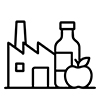
Food & Beverage

Paper Mills
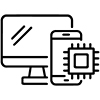
Electronics
Rental Cost
Push/pull attachments are moderately priced to rent. Expect to pay roughly:
| Rental Duration | What you can expect to pay |
| Day | $95 – 120 |
| Week | $150 – 180 |
| Month | $430 – 530 |
Note: These are not our prices but rather a useful benchmark for what you might pay to rent an attachment. Rental pricing may vary based on additional factors such as equipment condition, brand, and service inclusions.
Single-Double Pallet Handler
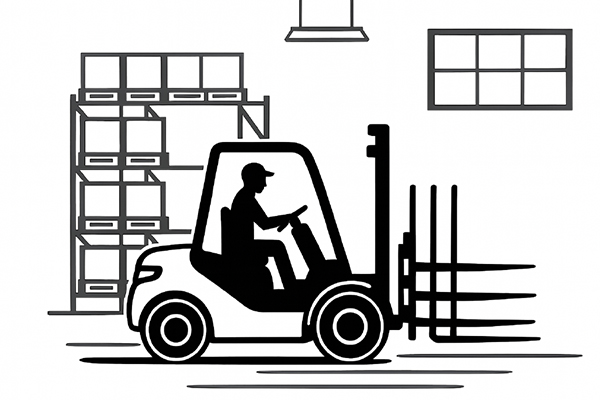
Benefits
A single-double pallet handler (sometimes just called a multiple pallet handler) is a fork attachment that can spread hydraulically to carry two pallets side by side or squeeze together to handle one pallet normally. This effectively doubles a forklift’s pallet handling capacity for lightweight loads. Renting a single-double attachment can dramatically increase throughput in loading or unloading operations – you move two pallets in one go, saving time. It also easily switches back to single-pallet mode, so you retain flexibility.
Use Cases
Rent a single-double pallet handler when facing a high-volume loading job or peak shipping season. For example, beverage distributors and breweries often rent these during summer or holiday surges to speed up moving cases of drinks. Similarly, a warehouse might rent one to load/unload trucks faster for a short-term contract. It’s useful whenever you need to boost productivity quickly without permanently altering your equipment. When the rush is over, you return the attachment.
Industries
The bottling and brewing industry is a major user of single-double pallet handlers (e.g. moving two pallets of beer or soda at once). Large warehouse operations and distribution centers also use them to shorten loading dock times. Any production facility or shipper dealing with many pallets of moderately weighted goods (like canned or boxed products) can benefit. These attachments are common in industries where handling speed is critical to meet demand.
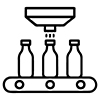
Bottling
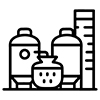
Brewing
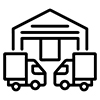
Distribution Centers
Rental Cost
Push/pull attachments are moderately priced to rent. Expect to pay roughly:
| Rental Duration | What you can expect to pay |
| Day | $95 – 120 |
| Week | $150 – 180 |
| Month | $430 – 530 |
Note: These are not our prices but rather a useful benchmark for what you might pay to rent an attachment. Rental pricing may vary based on additional factors such as equipment condition, brand, and service inclusions.
Rotator Attachments
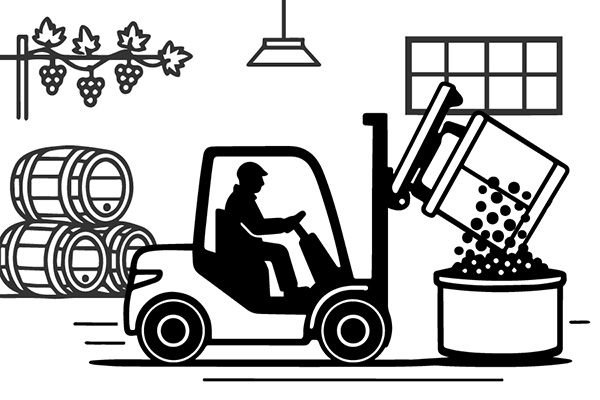
Benefits
A rotator attachment allows the forklift carriage (and whatever it’s carrying) to rotate typically 360°. This is extremely useful for dumping out containers or inverting loads. With a rotator, a forklift can lift a bin of scrap or a crate of produce, then precisely dump its contents and turn back upright. Renting a rotator gives you these capabilities only when you need them, enhancing your forklift’s functionality for tasks like pouring, mixing, or quickly offloading materials.
Use Cases
Common rental scenarios for rotators include agriculture and manufacturing. For instance, a farm co-op might rent a rotator to empty large fruit bins during harvest. A manufacturing plant could rent one to dump scrap metal or waste into hoppers. If you have an occasional need to invert or dump loads – such as mixing ingredients in a container or rotating pallets that were stacked incorrectly – renting a rotator on a short-term basis is far more practical than owning one that sits idle most of the year.
Industries
Agriculture, food processing, and recycling operations frequently use rotators. They are popular in any industry that requires frequent load dumping or repositioningconger.comfitzgeraldequipment.com. Examples include fisheries (for dumping crates of fish), wineries (for grape bins), municipalities (for waste bins), and factories (for swapping out material bins). These industries might rent rotators during specific seasons or projects to handle increased volume of material dumping.
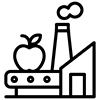
Food Processing

Recycling
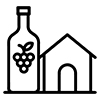
Wineries
Rental Cost
Rotator attachments rentals are similar to other mid-range attachments. Expect to pay roughly:
| Rental Duration | What you can expect to pay |
| Day | $95 – 120 |
| Week | $150 – 180 |
| Month | $430 – 530 |
Note: These are not our prices but rather a useful benchmark for what you might pay to rent an attachment. Rental pricing may vary based on additional factors such as equipment condition, brand, and service inclusions.
Fork Extensions
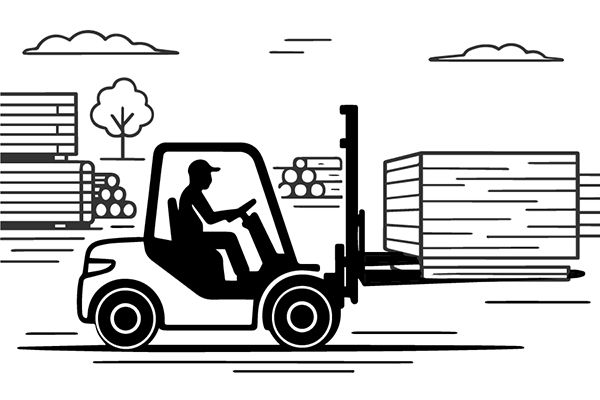
Benefits
Fork extensions are simple but handy attachments that extend the length of your forklift’s forks. They slide over and lock onto existing forks, allowing you to lift loads that are longer than the standard fork length or to reach deeper into storage racks and trailers. By renting fork extensions, you can temporarily equip your forklift to handle unusually long materials (like lumber, pipes, or oversized pallets) without buying a larger machine. They improve load stability for long items and reduce the chance of product damage or tipping from improperly supported loads.
Use Cases
Rent fork extensions whenever you encounter occasional extra-long loads. For example, a construction supplier might rent extensions to unload a flatbed of lumber or steel beams. A warehouse could use them to reach a double-deep pallet in a rack or to bridge a gap when loading from one trailer to another. Since these needs are infrequent for many businesses, renting extensions for the day or week makes perfect sense. It’s a quick, low-cost solution to adapt your forklift for special jobs.
Industries
Construction, lumber yards, metal fabrication shops, and manufacturing often use fork extensions. Any operation that might deal with lengthier loads now and then (heating/air-conditioning units, long rolls of material, large furniture pieces, etc.) can benefit. Even general warehousing might keep extensions on hand or rent them when rearranging large inventory. They are one of the most universally useful add-ons because almost every industry hits a point where standard forks aren’t quite long enough for a task.
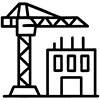
Construction

Lumber
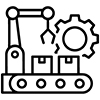
Manufacturing
Rental Cost
Fork extensions are very affordable to rent. Expect to pay roughly:
| Rental Duration | What you can expect to pay |
| Day | $25 – 35 |
| Week | $80 – 100 |
| Month | $240 – 300 |
Note: These are not our prices but rather a useful benchmark for what you might pay to rent an attachment. Rental pricing may vary based on additional factors such as equipment condition, brand, and service inclusions.
Specialized Forklift Attachments
Not every job will be covered by the common attachments above. There are many task-specific forklift attachments available for niche needs – from drum handlers and jib boom cranes to snow plow blades and work platforms. The key is to select the attachment that best suits your specific task.
For example, if you need to lift an odd-shaped load like a big industrial reel, you might rent a ram attachment (a single pole used for carpets or coils). If you need to lift a worker for maintenance, a certified forklift work platform could be rented. Always match the attachment to the job’s requirements to maximize safety and efficiency.
Ensuring Compatibility and Safety
When customizing a forklift with any attachment, compatibility and safety are paramount. First, confirm that the attachment is compatible with your forklift model – this includes the right carriage size and that your forklift has the required hydraulic functions (if the attachment uses hydraulics). Also check the forklift’s capacity: adding an attachment will shift the load center and add weight, effectively reducing the lift capacity of the forklift.
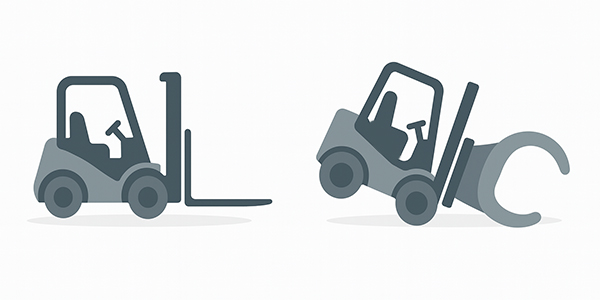
Rental providers can supply the adjusted capacity info; often a new nameplate or decal is provided to show the forklift/attachment combined rating. You should never exceed the rated capacity of a forklift with an attachment, as that risks tip-overs or dropped loads. OSHA regulations actually require you to get manufacturer approval for any attachment that affects capacity or safe operation – which reputable rental companies will have taken care of for the equipment they loan out.
Safety also means training your operators on the specific attachment. Forklift drivers should know how to use the new controls or functions (such as a clamp’s squeeze control or a rotator’s lock mechanism). If an attachment changes the forklift’s operating clearance or visibility (for instance, clamp pads may obscure forward view), operators must adapt their techniques.
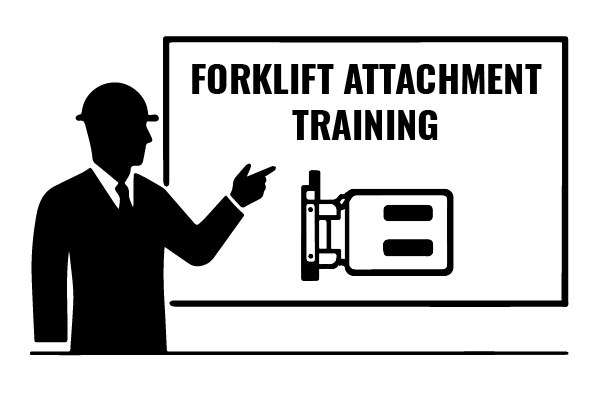
According to OSHA, operators should be trained on attachment use and limitations and even re-trained if a significantly different attachment is added. Taking these precautions ensures that using a specialized attachment will go smoothly and without incident. In short, always work closely with the rental provider to make sure the attachment is set up correctly on your forklift and that your team knows how to use it safely before the work begins.
Cost and Efficiency Benefits of Renting Forklift Attachments
Renting attachments as needed can provide significant cost advantages over buying.
Rental vs. Purchase
Purchasing a new forklift attachment can be a major capital expense – often ranging from several thousand dollars for simple extensions to well over $10,000 for hydraulic clamps or rotators. If your need for a given attachment is infrequent or temporary, renting is far more economical. For example, instead of spending $15,000 on a paper roll clamp that you might use only a few weeks a year, you could rent it for a few hundred dollars per week when needed.
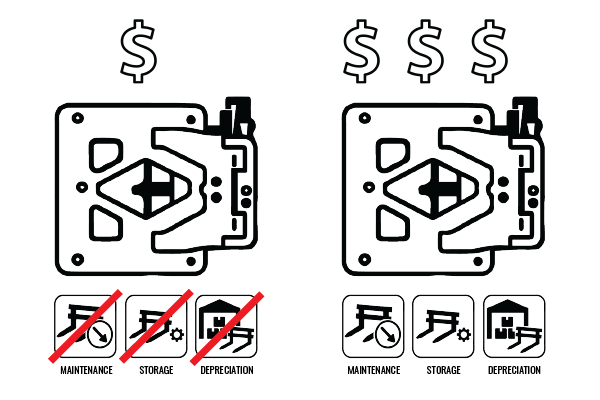
In general, forklift attachment rentals run on the order of $100 per day or $500–$1,000 per month for the heavier equipment (and much less for simple attachments). This pay-as-you-go model frees up capital for other priorities and eliminates the costs of long-term storage, maintenance, and depreciation of a purchased attachment. You also won’t have to worry about repairing an expensive attachment that’s rarely in use – the rental company handles upkeep and can provide a replacement if something goes wrong.
Beyond direct cost savings, renting attachments can lead to operational efficiency gains. By using the right attachment for the job, you can accelerate workflows and improve safety, which saves money indirectly.
For instance, a single-double pallet handler can almost double the loading speed for palletized goods, meaning you can turn trucks around faster and reduce labor hours. A rotator can dump materials in seconds that might otherwise require manual labor to shovel out. These efficiency improvements can have a big impact, especially during peak operations.
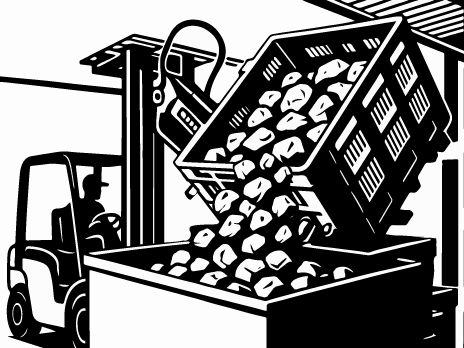
Renting gives you access to these productivity boosters without a long-term commitment. You can bring in an attachment to solve a problem or ramp up capacity, reap the benefits, and then return it when done. In effect, it lets one forklift perform multiple roles – multiplying your fleet’s capability on demand.
Companies that leverage rentals smartly often find they can take on new projects (that require special handling) or meet tight deadlines, all without the overhead of permanently expanding their equipment roster.
Choosing the Right Forklift Attachment Rental Provider
Selecting a trustworthy rental provider is as important as choosing the right attachment. When evaluating forklift attachment rentals from various companies, consider a few key factors:

Inventory and Availability
Do they offer the specific attachment you need in the right size or capacity? A good provider will have a wide range of attachments (from clamps to extensions) available and be able to advise you on the best choice.

Equipment Quality
Make sure their attachments are from reputable manufacturers (e.g. Cascade, a leading brand) and are well-maintained. You don’t want a hydraulic leak on a paper roll clamp causing a failure mid-project.

Service and Support
Ask if the rental includes installation of the attachment on your forklift or if they provide a compatible forklift if needed. The provider should be willing to help ensure the attachment fits and works properly. Also, check what support they offer in case of a breakdown or if you need a different attachment on short notice.
Other considerations include rental terms and flexibility. Look for straightforward terms on how they charge (daily/weekly rates, any overtime hour limits, etc.) and what happens if your project schedule changes.
FAQs (Frequently Asked Questions)

What types of forklift attachments can I rent?
You can rent virtually any common forklift attachment, including clamps (roll clamps, bale clamps, carton clamps), slip sheet push/pull units, double pallet handlers, rotators, fork positioners, drum handlers, fork extensions, and more. Rental companies often carry a broad selection of attachments to suit different tasks.

Will an attachment fit on any forklift?
Attachments are not universal to all forklifts – they must be compatible with your forklift’s carriage and hydraulic functions. When renting, you should verify the class of the fork carriage (e.g. Class II, III, etc.) matches the attachment and that your forklift has the required hydraulic circuits (for example, a rotator or push/pull needs an extra hydraulic function).

How much does it cost to rent a forklift attachment?
The cost depends on the attachment type and the rental duration. Simple attachments like fork extensions might only cost around $30 a day. More complex hydraulic attachments (clamps, rotators, pallet handlers) generally range roughly from $100 per day up to $500–$1,000 per month for longer rentals.

Is it better to rent or buy a forklift attachment?
It depends on your situation. If you need an attachment continually as part of daily operations, buying could be more cost-effective in the long run. However, if your need is seasonal or project-based, renting is often the smarter choice. Renting means you pay only for the time you use the attachment, avoiding a large upfront cost.

Do operators need special training to use rented attachments?
Yes, operators should be trained on any new attachment. Even experienced forklift drivers need to understand the differences an attachment brings. The way you handle loads with a clamp or push/pull differs from standard forks. OSHA regulations require training on attachments because they change a forklift’s operating characteristics.

Can I rent a forklift attachment without renting the forklift itself?
In most cases, yes – if you already have a compatible forklift, you can rent just the attachment. Many businesses own forklifts but need a special attachment temporarily, so rental companies commonly offer attachments à la carte.
Conclusion
Forklift attachments are more than just add-ons—they’re productivity tools that can transform how your operation moves, lifts, and handles materials. By renting the right attachment for your job, you not only increase efficiency but also improve safety and reduce operating costs. Whether you need a rotator for seasonal dumping, a push/pull for slip sheet handling, or fork extensions for long loads, the flexibility of renting means you only pay for what you need, when you need it.
